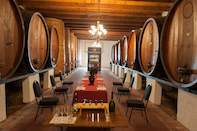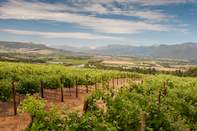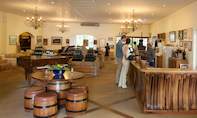Groundbreaking eco-friendly practices underpin farming here on these Simonsberg slopes, Backsberg is a convivial place for families to share good food and wine in the great outdoors 365 days a year.
Back Family Legacy

When C.L Back, a young Lithuanian immigrant, arrived in South Africa in the early 1900s, he started his new life as a dockyard-worker and delivery boy in Cape Town - and ended it as the owner of two flourishing wine farms. He bequeathed one to each of his two sons: Fairview to Cyril, and Backsberg, on the Paarl side of the Simonsberg, to Sydney.
At the time, the wine industry in South Africa was dominated by the cooperative system and corporate producers/wholesalers. Sydney Back was one of a handful of independent Cape vintners who turned privately owned wine farms into successful commercial enterprises, challenging industry conventions by establishing their own labels.
Not only did they make and bottle their own wines, but they marketed them directly to the public, inviting visitors to taste and buy at the farm and sometimes even serving a humble cheese platter on the patio. Thus began wine tourism in the Cape.
This same brand of entrepreneurship was passed down to Sydney’s son, Michael, a trained winemaker and viticulturist who joined his father on the farm in 1976.
While self-taught Sydney continued his pioneering work - planting Cabernet Sauvignon and Chardonnay, blending Chardonnay and Pinot Noir to make bottle-fermented sparkling wine, and distilling one of the Cape’s first modern ‘estate’-produced pot-still brandies - his reserved, bushy-beard son devoted himself to the vineyards.
A pioneer in his own way, Michael started focusing on achieving the balance between soil, water, vine and berry that would produce quality wine; a new concept at the time, it is now a widely accepted practice.
Eco-Farming Pioneer

While the day-to-day winemaking was the province of his resident winemaker (for the past decade Alicia Rechner), Michael concentrated on the land and drove Backberg’s progressive environmental efforts. The farm is a BWI (Biodiversity & Wine Initiative) Champion, preserving 35 hectares of rare fynbos vegetation, and was the first South African wine cellar - and the third in the world - to gain carbon neutral status.
True to the family’s roots, the tasting room in the original winery, with its low wooden ceiling and wrought iron hanging lamps, had the feel of a small-town general dealer’s store. Cases of wine were stacked along one wall and individual bottles are displayed on hessian-covered wooden bins or nestled in wooden shavings.
Black-and-white photographs from the early 1900s show C.L Back and friends, sleeves rolled up, pumping wine out of small concrete tanks. Rustic chalkboards indicated what was on offer: an older vintage perhaps, or a bottle of Pinneau (an unfermented wine fortified with the winery’s own pot-still brandy).
There was a range of Kosher wines as well, and South Africa’s first Kosher sparkling wine came courtesy of Backsberg. The Back’s family’s pride in their winemaking heritage was shared via displays of antique winemaking equipment and a collection of awards and trophies from way back.
Starting at the top, the Babylons Toren range featured Backsberg’s exceptional bottlings from any particular vintage, be it a blend of reds, Chardonnay or a rare single-varietal Viognier.
The Black Label was reserved for vintage regulars that showed exceptional quality, from the enduring Klein Babylonstoren classic Bordeaux-style blend and John Martin Reserve Sauvignon Blanc to the single-vineyard Pumphouse Shiraz and the ‘Mediterannean’ blends of unusual varieties, such as Elbar (red), Aldorina (white) and Bella Rosa (rosé).
New Beginnings

There’ve been major changes at Backsberg recently. The farm was bought in 2020 by media baron and businessman Koos Bekker who, with interior decorator wife Karen Roos, restored historic neighbouring wine farm Babylonstoren, combining modern wine production with heritage farm activities to create a stylish model wine tourism destination. Developments on what was formerly Backsberg Estate are awaited.
Meanwhile, Michael Back has retired after nearly a half-century in the industry, having sold the Backsberg wine business, re-branded as Backsberg Family Wines, to long-established premium wine company DGB, with third-generation Simon Back as a director in charge of Backsberg Family Wines.
A new winery near DGB’s Franschhoek Wine Cellars will produce the wines (the names Babylons Toren and Klein Babylonstoren dropped from their labels.)
 The Paarl winelands border Stellenbosch to the north and northeast, opening up into a broad valley with granite outcrops of Paarl Mountain a...
The Paarl winelands border Stellenbosch to the north and northeast, opening up into a broad valley with granite outcrops of Paarl Mountain a...